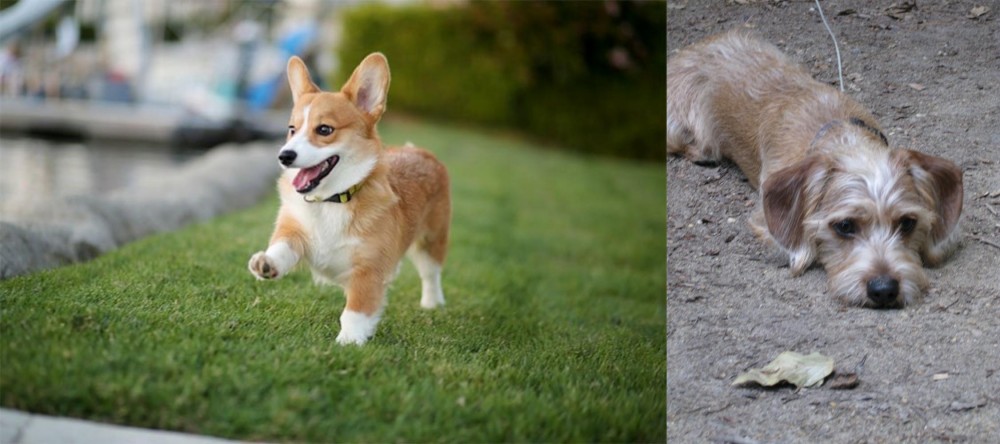 Petzlover
Petzlover Both Corgi and Schweenie are originated from United Kingdom. Corgi may grow 20 cm / 7 inches shorter than Schweenie. Both Corgi and Schweenie are having almost same weight. Both Corgi and Schweenie has almost same life span. Corgi may have more litter size than Schweenie. Both Corgi and Schweenie requires Low Maintenance.
Both Corgi and Schweenie are originated from United Kingdom. Corgi may grow 20 cm / 7 inches shorter than Schweenie. Both Corgi and Schweenie are having almost same weight. Both Corgi and Schweenie has almost same life span. Corgi may have more litter size than Schweenie. Both Corgi and Schweenie requires Low Maintenance.
 Known as a cattle herding dog breed, the Corgi hails from Pembrokeshire, Wales. You get 2 breeds – the Cardigan Welsh Corgi and the Welsh Corgi.
Known as a cattle herding dog breed, the Corgi hails from Pembrokeshire, Wales. You get 2 breeds – the Cardigan Welsh Corgi and the Welsh Corgi.
The word ‘Korgi’ actually means ‘dwarf dog’. According to some, the small dog’s history goes back as far as 1107AD, but when you start doing research, you find that the Pembroke Welsh Corgi doesn’t have a traceable breed history.
The Pembrokeshire Corgi was officially recognized by the Kennel Club in the United Kingdom in 1934 and is a breed separate from the Cardiganshire Corgi.
 The Schweenie is a hybrid dog, with the parent breeds being the Shih Tzu and the Dachshund.
The Schweenie is a hybrid dog, with the parent breeds being the Shih Tzu and the Dachshund.
The Schweenie dog has been around for about 4 decades when breeders were looking for a dog that would be free of the health issues of the purebred parent breeds.
Because the Schweenie is a mix breed, it doesn’t qualify to be part of the American Kennel Club. He is however recognized by the Designer Breed Registry and some other clubs.
 The Corgi is a small to medium sized dog, standing at 25 to 30cm and weighs between 10 to 14kg.
The Corgi is a small to medium sized dog, standing at 25 to 30cm and weighs between 10 to 14kg.
The coat of the Corgi is fairly short to medium length and is thick. You’ll find him to be available in colors such as red, fawn, black and tan and with white markings.
He has a sharp, intelligent face with an amicable expression. Looking much like a fox with short legs, he has a long, low-set body body and is a sturdy dog. His ears also stand erect and he has a docked tail.
 The Schweenie will be a smallish dog standing at roughly 27cm to 50cm and weighing 4 – 9kg.
The Schweenie will be a smallish dog standing at roughly 27cm to 50cm and weighing 4 – 9kg.
Because of the Dachshund parent, he will likely have a long body. The coat is shortish to medium length and can be a variety of colors – from a rusty color to brown, black, grey and even a cream shade. The ears are floppy and the tail medium length.
He is a small dog who is smart and bright and who wants to please his human owners. He loves people and wants to be around them and involved in their activities.
Small and cute though he is, he can be a stubborn dog and become a little big aggressive too if he is feeling a bit moody. He will need to be trained and socialized if you want him to obey your simple commands such as sit, stay, lie down and come.
He is intelligent enough to learn these simple commands with ease.He is both alert and vigilant, and this makes them good watchdogs.
 The sweet little Corgi is well known with his association with Britain’s Queen Elizabeth who has always loved these dogs with their long bodies and short legs. But while the Corgi may well be associated with royalty, he isn’t too snooty by any means to be your pet.
The sweet little Corgi is well known with his association with Britain’s Queen Elizabeth who has always loved these dogs with their long bodies and short legs. But while the Corgi may well be associated with royalty, he isn’t too snooty by any means to be your pet.
He has got a wonderful personality, and he is just waiting to be allowed into your household where he will prove to be a loving, devoted companion and friend.
 The Schweenie can be somewhat reserved and they need exercise regularly as well. If they don’t get enough exercise, they tend to become jittery and this can make them become a bit snappy. The are more prone to be snappy and aggressive with children who haven’t been taught how to treat animals gently and with respect.
The Schweenie can be somewhat reserved and they need exercise regularly as well. If they don’t get enough exercise, they tend to become jittery and this can make them become a bit snappy. The are more prone to be snappy and aggressive with children who haven’t been taught how to treat animals gently and with respect.
They’re small enough to adjust to life in the city or countryside but will still need to be exercised.
The little Schweenie, with the right kind of owner can become a great little pet and companion.
 A corgi, when he is well looked after, can live to be anything from 12 to 15 years of age. However even this sturdy dog may well be susceptible to some of the more common dog illnesses, such as hip dysplasia and degenerative myelopathy.
A corgi, when he is well looked after, can live to be anything from 12 to 15 years of age. However even this sturdy dog may well be susceptible to some of the more common dog illnesses, such as hip dysplasia and degenerative myelopathy.
Also you have to be careful with your Corgi and make sure that he doesn’t gain weight as this weight gain can bring with it a host of health complications.
Hip dysplasia with your Corgi is about an abnormal joint structure where the bones lose contact with each other. This parting of the bones is known as subluxation, and it is this subluxation that can cause your pet pain and discomfort and lead to osteoarthritis.
This disease isn’t reserved for old dogs either, and some young dogs can begin to show signs of this disease before they reach their first birthday. Without taking your dog to the vet and having medical intervention, your pet may eventually be unable to walk.
It is so sad when Degenerative Myelopathy invades your pet as it is a devastating disease watching your pet become paralyzed. The disease seems to come on when then dog is between 8 and 14 years of age where your pet loses co-ordination in the hind limbs, getting worse until he can no longer walk. Often your dog can no longer control his urine output.
There are no real treatments that have stopped the progression of the disease and your vet may suggest treatments that can make your pet more comfortable You vet may compassionately suggest your dog be put down, particularly for those people who can’t afford treatment.
 With good care, your Schweenie can live to be 12 to 15 years of age. Every dog, no matter how healthy, can get some of the health problems that plague many dogs.
With good care, your Schweenie can live to be 12 to 15 years of age. Every dog, no matter how healthy, can get some of the health problems that plague many dogs.
This is where the cushions between each vertebra come into contact with the spinal cord. It can result in nerve damage and sometimes even paralysis. Because the Shih Tzu is one of the parent breeds, you will need to be aware of this ailment as these dogs are more susceptible to this disease.
Hypoglycemia is fairly common in small dogs and it is where there is a drop in blood sugar. It can be brought on by stress. It can also be referred to as low blood sugar and it can be deadly. If your pet is hypoglycemic, you will notice a loss in appetite, extreme lethargy, trembling and unusual behavior. You will need to get your Schweenie to the vet immediately for tests and treatment.
 The Corgi isn’t a particularly heavy shedder, so a brush down twice a week will be excellent for his thick coat. And of coarse he will thrive on the attention given to him during the brushing session.
The Corgi isn’t a particularly heavy shedder, so a brush down twice a week will be excellent for his thick coat. And of coarse he will thrive on the attention given to him during the brushing session.
Corgis love walks and sniffing around as they go along. They’re energetic dogs so you’ll need to include him in your daily walks which he just loves, and include him in some ball games.
Corgis may be short in stature but they are robust dogs – sturdily built. They are active dogs and can use up a lot of calories. They will certainly require a diet that features good quality protein.
Feed your Corgi a good quality food designed for special life stages – puppy, adult, pregnant female, senior dog and also dogs with illnesses.
Most Corgis do well having 2 meals of kibble a day. Puppies usually eat 4 meals a day until they are old enough to move onto an adult feeding schedule. Include cooked rice, meat and vegetables in his diet as well as raw meat from time to time and ensure there is always a bowl of clean, cool water available.
 Your Schweenie will need to be brushed at least twice a week to rid him of loose hairs. Because of his floppy ears, you will need to clean them and check for redness. If you don’t like the idea of probing inside the ear, professional groomers or the vet will do it for you.
Your Schweenie will need to be brushed at least twice a week to rid him of loose hairs. Because of his floppy ears, you will need to clean them and check for redness. If you don’t like the idea of probing inside the ear, professional groomers or the vet will do it for you.
Trim his nails if they don’t wear down on their own.
Provide him with a nice dry, warm spot to sleep.
Provide him with nice chewy toys that will keep him occupied.
Exercise him every day. Taking him on walks and playing ball games with him will keep him fit and trim but also help with staving off boredom.
Ensure his vaccines against deadly diseases are up to date. See that he gets to the vet when he appears to be under the weather.
He is a small dog so you have to be careful about how you feed him. You need to feed him a nutrient-rich dry kibble. Read the packaging and buy dog food according to his size, age and activity levels.
Try and include some home-made food into your dogs diet. A little bit of boiled chicken, brown rice or pasta, sweet potatoes, carrots and spinach all chopped up will do him good and can be added into the dry kibble twice a week. Some raw meat should also occasionally be added in as this can help to prevent some skin problems. Be sure that cool, fresh water is available for your pet at all times.